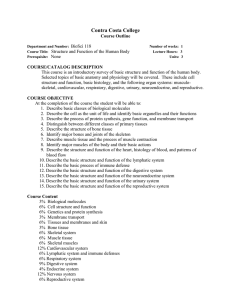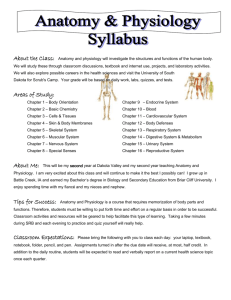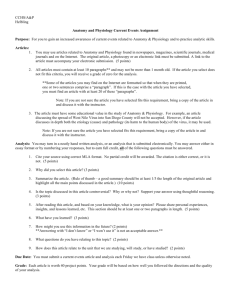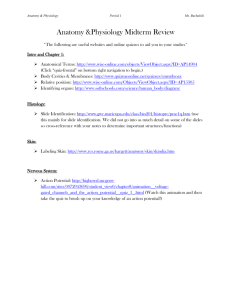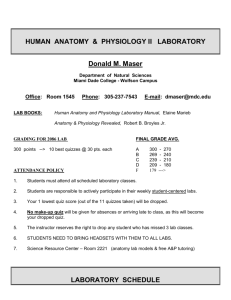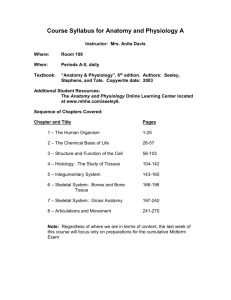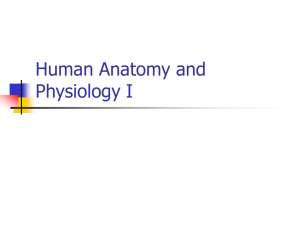syllabusSpring2011CRN62206_2.doc
advertisement
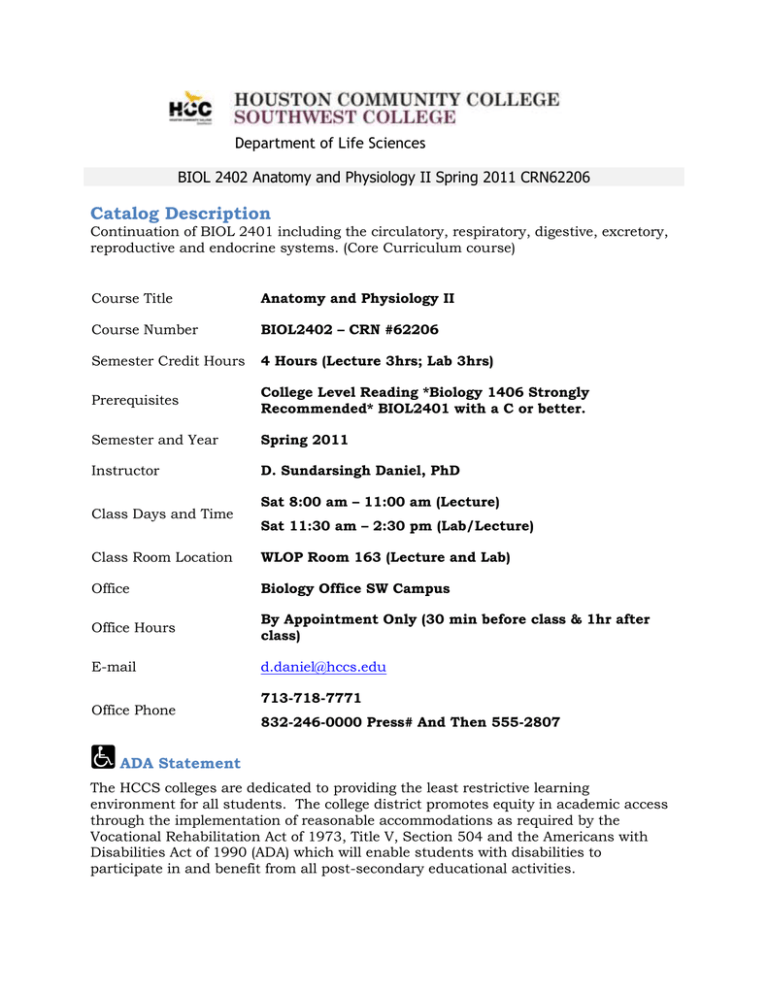
Department of Life Sciences BIOL 2402 Anatomy and Physiology II Spring 2011 CRN62206 Catalog Description Continuation of BIOL 2401 including the circulatory, respiratory, digestive, excretory, reproductive and endocrine systems. (Core Curriculum course) Course Title Anatomy and Physiology II Course Number BIOL2402 – CRN #62206 Semester Credit Hours 4 Hours (Lecture 3hrs; Lab 3hrs) Prerequisites College Level Reading *Biology 1406 Strongly Recommended* BIOL2401 with a C or better. Semester and Year Spring 2011 Instructor D. Sundarsingh Daniel, PhD Class Days and Time Sat 8:00 am – 11:00 am (Lecture) Sat 11:30 am – 2:30 pm (Lab/Lecture) Class Room Location WLOP Room 163 (Lecture and Lab) Office Biology Office SW Campus Office Hours By Appointment Only (30 min before class & 1hr after class) E-mail d.daniel@hccs.edu Office Phone 713-718-7771 832-246-0000 Press# And Then 555-2807 ADA Statement The HCCS colleges are dedicated to providing the least restrictive learning environment for all students. The college district promotes equity in academic access through the implementation of reasonable accommodations as required by the Vocational Rehabilitation Act of 1973, Title V, Section 504 and the Americans with Disabilities Act of 1990 (ADA) which will enable students with disabilities to participate in and benefit from all post-secondary educational activities. If you require reasonable accommodations because of a physical, mental, or learning disability, please notify the instructor of this course as soon as possible and preferably before the end of the first two weeks of class to arrange for reasonable accommodations. (see front page) Prerequisites College reading level as determined by SAT, ACT, TASP; or successfully passing ENGL0305 with a “C” or better and passing BIOL2401 with a “C” or better. Program Learning Outcomes: Program SLO #1: To recognize, identify, and describe the basic structures and functions associated with most life forms. Program SLO #2: To develop basic laboratory techniques appropriate to the field of Biology. Program SLO #3: To develop study skills and habits appropriate for pre-professional students interested in health-related fields. The following Student Learning Outcomes with their associated assessment criteria are not meant to be all-inclusive, and are meant to be used along with all other course learning outcomes and assessment devices, listed under Course Objectives, in the determination of the student's final course grade. Completion of the specific Student Learning Outcomes listed below, at any assessment grading level, does NOT and will NOT guarantee the student the final course grade at the end of the semester. Course Student Learning Outcomes: This course is intended to provide students with a strong foundation in Anatomy and Physiology and is the continuation of Anatomy and Physiology I. In this course, we will study the endocrine system, the cardiovascular system, including heart, blood vessels, the respiratory system, the digestive system, the urinary system including electrolyte and fluid balance, the reproductive system and finally the immune system. The course is vigorous and many will find it very challenging. 1. Students will be able to analyze the circulatory system) including the lymphatic and immune systems0 and their components. PSLO#1 and 2 2. Students will be able to understand hormonal control of body systems and homeostasis. PSLO#1 3. Students will be able to analyze the histology, gross anatomy and the physiology of the respiratory and urinary systems applying the structural and physiological linkage of these systems with the cardiovascular system. PSLO#1 4. Students will be able to analyze, understand and explain the structure and function of the digestive system correlating it with metabolism. PSLO#1 5. Students will be able to analyze and evaluate the structure, function and regulation of the reproductive system. PSLO#1 6. Students will be able to apply the knowledge gained in lab utilizing anatomical models and physiology experiments. PSLO#2 7. Students will utilize online interactive evaluation tools to gauge their understanding of key anatomical and physiological concepts prior to lecture/examinations/quizzes where applicable. PSLO#3 Learning Objectives: 1) Consistently able to demonstrate part to function relationship and the interaction of the circulatory, lymphatic and immune systems without the instructor’s help. 2) Consistently able to demonstrate understanding and application of hormonal control on homeostasis without the instructor’s help. 3) Consistently able to demonstrate part to function relationship and the interaction of the respiratory/urinary systems with the cardiovascular system without the instructor’s help. 4) Consistently able to demonstrate part to function relationship involving the digestive system and its correlation with metabolism without the instructor’s help. 5) Consistently able to demonstrate interactions of parts to functions involving the reproductive system without the instructor’s help. 6) Consistently prepared and always able to demonstrate skills using the body system models and laboratory techniques at the classroom standard. 7) Consistently uses online tools to prepare for class, always ready for classroom discussions and instructor’s Q&A sessions, completes all online quizzes prior to due dates. Required Text Anatomy & Physiology: The Unity of Form and Function 5th Edition Kenneth S. Saladin ©2009, ISBN-13 9780073525693 MHID 0073525693 Laboratory Manual Required: Anatomy and Physiology II by Keating and Wiersema. (Not required but, recommended. Can be used in place of required lab manual) Laboratory Manual for Human Anatomy & Physiology: Cat Version w/PhILS 3.0 CD, 1st Edition Terry R. Martin ©2010 ISBN-13 9780077274351 MHID 0077274350 Other Operating Guidelines (1) You are spending a good deal of time, energy and money on this course – please, make the most of your investment! There is a school-mandated attendance requirement for this course (please see the “Classroom Evaluation” section for a description). If you’re still struggling with certain aspect of the course, please make an effort to see me and I will gladly make time to help you work through the material. (2) Make up tests are very difficult to schedule and may not be rescheduled for unauthorized absences. I reserve the right to give students who miss a test an alternate version of the appropriate test. Other assignments not turned in on time will be docked 10% of their final value for each class day that they are late. There will be NO makeup labs or lab exams. (3) My purpose in this class is to act as your guide through this subject material. I also must make sure that your grade in this class indicates your mastery of the subject material required by this college. I am not here to spoon-feed you. It takes approximately 2-3 hours of study time for each hour of class time to master the material. This class will have over 96 contact hours (4 hr. credit) compared to 48 contact hours that comprise the normal class (3 hr. credit). The class and study time necessary to succeed in this class will be close to 300 hours (60 hours per week)! If you cannot put in the time please take the course, when you can put in that kind of time, at later time! (4) Please do not talk during class. If you feel the need to discuss something with a classmate, please do so outside. I will not be offended if you need to take an important conversation outside briefly so as not to distract your classmates. No cell phones on in class and pagers off or on vibrate. EVALUATION Your final grade for the course will be determined by the following formula: 40% 30% 5% 10% 15% Lecture Laboratory (Practical Exams) Quizzes, Assignments, & Lab work Writing Project Comprehensive Final A = 100-90% B = 89-80%; C = 79-70%; D = 69-60%; F = Below 60% Tests There will be 6 tests throughout the course (including the comprehensive final exam). Dates for the tests are listed in the course calendar. The tests will cover material covered prior to the date of each test material). Tests will be given at the beginning of class on designated dates (see course calendar) with lecture or lab following the test. The final exam will cover material from the entire course, but about half of the final exam will contain material from the chapters and labs not covered in previous tests. WRITING PROJECT Each student will complete a writing project about a specific disease. This single project is worth 10% of the Final Average. Further details will be given in class. On Line Resources/Home Work Assignments Open book online quizzes on McGrawHill Connect: http://connect.mcgrawhill.com/class/s_daniel_copy1ofhcc2402connectshellspring2011 Black Board Vista Course URL: http://hccs.blackboard.com/webct/logon/34346310156031 HCC-SW departmental website: http://swc2.hccs.edu/lifesci0607/ Reading Assignments & Possible Unannounced Quizzes It is expected that each student will read the pre-assigned section of the text BEFORE coming to CLASS each day. Reading assignments for each class will be given at the end of the previous class. Use the class schedule to stay ahead of the lectures. The instructor may give pre-lecture quizzes to make sure the students are prepared for class. Follow the Course Calendar. These quizzes MAY NOT BE ANNOUNCED in advance. Proposed Course Calendar (Subject to change when necessary) BIOL2402 Anatomy and Physiology II Spring 2011 CRN62206 Lecture and Lab Room 163 (Sat 8:00 am to 11:00 am; 11:30 am to 2:30 pm) Week 1 Lecture Course Introduction – Syllabus Jan 22 Chapter 17: The Endocrine System Lab Introduction: Safety Issues Exercise 1: Microscopy Review/Endocrine System Week 2 Lecture Chapter 18: The Circulatory System: Blood Jan29 Lab Exercise 2: Blood Cells, Blood Testing, Blood Typing Week 3 Lecture 8:00 am: Test # 1, Chapters 17, 18 Feb 05 Chapter 19: The Circulatory System: The Heart Lab Exercise 3:Anatomy, Blood Supply & Histology of Heart, Cardiac Cycle, ECG/EKG Week 4 Lecture Chapter 20: The Circulatory System: Blood vessels and Circulation Feb 12 Lab Exercise 4: Structure and Histology of Blood Vessels, Pulse Rate, BP Week 5 Lecture Chapter 21: The Lymphatic and Immune System Feb 19 Lab 8:30 am: Lab Practical 1 (Endocrine, Blood, & Heart) Exercise 5: Anatomy & Histology of Lymphatic Vessel/Valve, Lymph Node, Tonsils, Spleen, Thymus, Appendix. Week 6 Lecture 8:00 am: Test # 2, Chapters 19, 20 Feb 26 Chapter 21: The Lymphatic and Immune System (continued) Chapter: 22: The Respiratory System Lab Exercise 6: Anatomy and Histology of Respiratory Organs Week 7 Lecture Chapter: 23: The Urinary System Mar 05 Lab 8:30 am: Lab Practical 2 (Blood Vessels & Lymphatic System) Exercise 7: Breathing and Respiratory Volumes Week 8 Lecture 8:00 am: Test # 3, Chapters 21, 22, 23 (8 am, Sat, 12 Mar, 2011) Mar 12 Chapter 24: Water Electrolyte and Acid Base Balance Lab Exercise 8: Anatomy & Histology of Kidney, Bladder, Urethra; Urinalysis Spring Break Mar 14 - 20 Week 9 Lecture Chapter 25: The Digestive System Mar 26 Lab Exercise 8: Digestive Organs Exercise 8: The Action of a Digestive Enzyme Week 10 Lecture Chapter 26: Nutrition and Metabolism Apr 02 Lab 8:30 am: Lab Practical 3 (Respiratory & Urinary Systems) Exercise 9: Cat Dissection Week 11 Lecture 8:00 am: Test #4, Chapters 24, 25, 26 Apr 09 Chapter 27: The Male Reproductive System Lab Exercise 10: Male Reproductive System; Exercise 11: Female Reproductive System Week 12 Lecture Chapter 28, The Female Reproductive System Apr 16 (“W” Lab Exercise 11: Female Reproductive System (continued) 4:30pm04/14) Exercise 9a: Cat Dissection Week 13 Apr 23 No Classes (Easter/Spring Holiday Apr 22 – 24) Week 14 Lecture 8:00 am: Test #5, Chapters 27, 28 Apr 30 Lab Exercise 12: Meiosis, Embryology Week 15 Lecture Chapter 29, Human Development and Genetics (Tested in the final exam) May 07 Review for Final Exam: Tests 1 - 5 Lab 8:30 am: Lab Practical 4: Digestive and Reproductive Systems Week 16 LECTURE FINAL EXAM (Comprehensive, Chapters 17 - 29) May 14 8:30 AM, SAT, 14 MAY, 2011 Attendance Policy Students are expected to be on time for class. After four unexcused absences, the professor recommends the student drop the class. In order for an absence to be considered “excused” the student must bring some form of documentation as to the reason for the absence (e.g. doctor’s note, court record, etc.). Partial unexcused absences from class will also be considered to be “absences”. The instructor reserves the right to take attendance at any time, even several times, during class. A student may be dropped from the class after four absences, but it is the student’s responsibility to drop the class officially if that is their intension. Class Participation While there is no “formal” assessment of your participation in class, it is appreciated and will no doubt aid in your learning (and your classmates’ learning) of the material! Make-Up Exam Policy Make up tests are very difficult to schedule and may not be rescheduled for unauthorized absences. I reserve the right to give students who miss a test an alternate version of the appropriate test. Other assignments not turned in on time will be docked 10% of their final value for each class day that they are late. There will be NO makeup labs. Warning! Students who are repeating this class for the third time will be charged an additional fee per class hour. International Students Receiving a W in a course may affect the status of your student visa. Once a W is given for the course, it will not be changed to an F for visa considerations. You may contact the International Student Office at 713 718 8520 if you have any questions about your student visa status or other transfer issues. Disclaimer Changes may be made to this syllabus when deemed appropriate by the professor. Students will be notified of any changes in a timely manner. Guaranteed Graduation Policy Houston Community College System guarantees that graduates of its Associate of Arts, Associate of Science, or Associate of Applied Science and all Certificate programs, providing under certain circumstances, additional education and training tuition free to students lacking appropriate mastery of specified competencies. For additional information, refer to the HCCS college catalog. Withdrawal Policy Withdrawal from the course after the official day of record (see current catalog) will result in a final grade of “W” on the student transcript and no credit will be awarded. Prior to the official day of record, it is the student’s responsibility to initiate and complete a request for withdrawal from any course. (Spring 2011 = Thu, Apr 14, 4:30 pm) Academic Integrity HCCS is committed to a high standard of academic integrity in the academic community. In becoming a part of the academic community, students are responsible for honesty and independent effort. Failure to uphold these standards includes, but is not limited to, the following: plagiarizing written work or projects, cheating on exams or assignments, collusion on an exam or project, and misrepresentation of credentials or prerequisites when registering for a course. Cheating includes looking at or copying from another student's exam, orally communicating or receiving answers during an exam, having another person take an exam or complete a project or assignment, using unauthorized notes, texts, or other materials for an exam, and obtaining or distributing an unauthorized copy of an exam or any part of an exam. Plagiarism means passing off as his/her own the ideas or writings of another (that is, without giving proper credit by documenting sources). Plagiarism includes submitting a paper, report or project that someone else has prepared, in whole or in part. Collusion is inappropriately collaborating on assignments designed to be completed independently. These definitions are not exhaustive. When there is clear evidence of cheating, plagiarism, collusion or misrepresentation, a faculty member will take disciplinary action including but not limited to: requiring the student to retake or resubmit an exam or assignment, assigning a grade of zero or "F" for an exam or assignment; or assigning a grade of "F" for the course. Additional sanctions including being withdrawn from the course, program or expelled from school may be imposed on a student who violates the standards of academic integrity. Software Piracy Law strictly prohibits unauthorized copying of software purchased by Houston Community College for use in laboratories. Houston Community College administration will take appropriate disciplinary action against anyone violating copyright laws. Computer Virus Protection Computer viruses are a fact of life. Using the diskettes on more than one computer creates the possibility of infecting computers and diskettes with a computer virus. This exposes the computers of the college, your personal computer, and any others you may be using to potentially damaging viruses. The college has aggressive anti-virus procedures in place to protect its computers, but cannot guarantee that a virus might not temporarily infect one of its machines. It is your responsibility to protect all computers under your control and use and ensure that each diskette you use, whenever or wherever you use it, has been scanned with anti-virus software. Since new viruses arise continually, your anti-virus software must be kept current. And, since no anti-virus software will find every virus, keeping copies of data (backups) is extremely important. Equal Opportunity Statement It is the policy of the Houston Community College System to provide equal employment, admission and educational opportunities without regard to race, color, religion, national origin, sex, age, or disability. HCCS Colleges strive to provide an excellent learning environment free from harassment or intimidation directed at any person’s race, color, religion, national origin, sex, age, or disability. Any form of harassment will not be tolerated. Acknowledgment My thanks to Dr Loesch, Dr. Fenton, Dr. Switzer, Don Shult and Dr. Garcia for allowing me to use their class syllabi as a guide. Biology 2402 Acknowledgment I acknowledge that I have read the syllabus for Biology 2402 and understand the effort and time (approximately 300 hours) commitment necessary to succeed in this Science Major, Medical Professional Class. Semester & CRN Signature Name (Printed) Email Address Current Phone #
